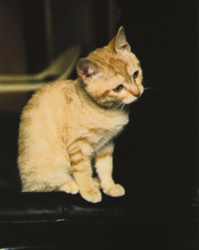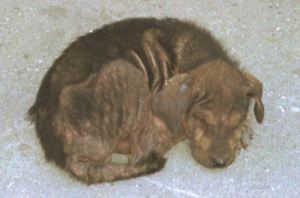 Family pets
Family petsWhile some pets enjoy extravagant lives, others are dumped on the streets
by Apple Fu



 Family pets
Family pets
While some pets enjoy
extravagant lives, others are dumped on the streets
by Apple Fu
 Pets have been considered to be faithful companions of people for a long time.
However, not every pet can find a master who values it as such.
Pets have been considered to be faithful companions of people for a long time.
However, not every pet can find a master who values it as such.Mimi, a Yorkshire terrier kept by Miss Chow Lai King of Tuen Mun, is one of the lucky ones. “I regard Mimi as my daughter,” Miss Chow said as she patted Mimi gently.
Miss Chow spends much time and money on grooming Mimi’s hair, brushing its teeth, preparing its food and cleaning up its droppings. For the winter, she bought a $300 sweater for Mimi.
Despite the money and time, Miss Chow enjoys Mimi’s companionship.
However, not all small animals are fortunate enough to be taken care of by such loving masters. Many dogs and cats are dumped on streets and end their lives miserably.
According to the Royal Society for the Prevention of Cruelty to Animals, between April 1994 and March 1995, 11,000 animals sent to RSPCA were surrendered by their owners. Those collected or rescued by inspectors amounted to 5,048. Thus, the number of animals RSPCA received added up to 16,048 in the period.
RSPCA’s public relations manager, Miss Amy Chow, said that the number of surrendered animals has risen this year by 12.9 percent, compared to last year.
She explained that this was due to reckless decisions made by keepers.
“They just send their pets away when they cannot afford them anymore,” she said.
Figures disclosed by the Agriculture and Fisheries Department show that about 12,900 wandering dogs were found last year.
According to the department, this was partly caused by a law prohibiting the keeping of domestic animals in public estates.
Moreover, some dogs are kept as watchdogs in construction sites, and when the projects are finished, they lose their homes. Owners who fail to have their pets sterilized also magnify the problem.
Miss Chow said, “Those abandoned animals are examined to decide whether they are suitable for adoption.
“Those who pass the examination wait for new owners.
“Then, all these cats and dogs are required to be sterilized,” said she.
She said that among the 11,000 surrendered animals in 1994 and 1995, only 1,800 were adopted. That is, only about 6.1 percent of them were able to find new homes. Many animals face no alternatives but death.
Even they are adopted, their new lives are still uncertain. There is no law stopping cruel keepers to keep pets again.
Some people even keep pets for making a profit.
Illegal hawkers usually keep puppies in a confined carton, without an adequate and constant supply of fresh water.
A breeding area in Yuen Long with 22 dogs and three cats was discovered by RSPCA in October 1995. Many of them were dying of starvation. They were dirty and gave off a nasty smell. It was believed that the owner imported full-blooded dogs for breeding and then sold the puppies at lucrative prices.
From January to June 1995, 10 complaints about illegal sales of pets have been received by the Agriculture and Fisheries Department. However, many cases go unreported.
“Patronizing illegal dealers also encourages breeding activities,” said Miss Chow.
“People are advised not to buy animals from illegal hawkers, since these animals may have already been infected with diseases. They will die sooner or later,” said she.
The RSPCA asserted that more severe punishments are needed to defer the illegal trade.
They suggested that the existing license system should be reviewed. Restrictions such as size of cages, breeding rates and hygienic conditions should be included. However, when legislation will be formulated is still unknown.
Miss Chow said that they now rely on the public to report cases of cruelty.
“Those potential owners have to take many factors such as time, money, prior approval of family into serious consideration.
“Otherwise, they will put their pets’ lives at risk,” Miss Chow said.

